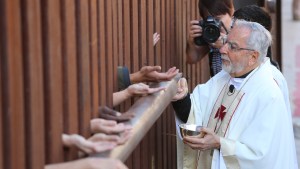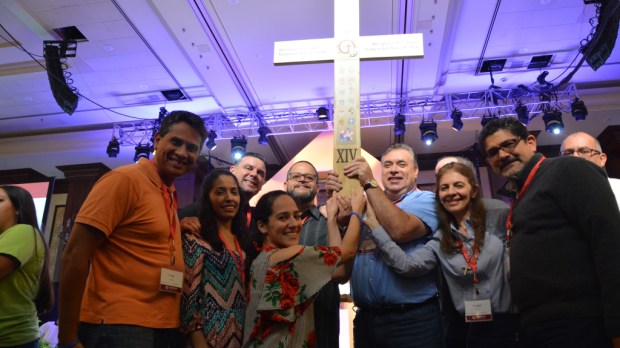The scandals and polemics that have erupted in recent months could give the impression that the Catholic Church in the United States is in decline.
Nonetheless, anyone who participated in the Fifth National Encuentro of Hispanic/Latino Ministry, held in Grapevine, Texas, could see that Catholicism in the United States holds great surprises.
There are five factors that will determine what the face of the Catholic Church will look like in upcoming decades in this country. We could see them at this Encuentro.
1. Numbers talk
Above all, the numbers speak for themselves. As was made clear by the studies presented by one of the most prominent experts in the field, Hosffman Ospino, associate professor of Hispanic Ministry and Religious Education at Boston College, there are currently 52 million Hispanics in the United States (not counting undocumented immigrants), of which 68% are Catholic.
There are 75 million Catholics in the country today; in 1965, there were 48.5 million. According to Ospino, this means that “Hispanics make up 71% of the growth of the Catholic population in the United States since 1960.”
During the Encuentro, various experts stated that 60% of Catholics under the age of 18 are Hispanics.
From September 20 to 23, more than 3,000 representatives gathered in Grapevine, chosen from among 250,000 participants in parochial and regional encounters that preceded this great national convocation.
The presence of 157 bishops at the congress reflected very clearly the importance of the event: In the United States, there are a total of 255 active bishops.
2. Without ecclesial polemics
At the end of the event, Professor Guzmán Carriquiry Lecour, president of the Pontifical Commission for Latin America, described it as “a balm for our wounds, a caress from God.”
The atmosphere, in both the plenary assemblies and in the hallways, was very different from that experienced in recent weeks at many other meetings of Catholic representatives in the United States, where divisions and polemics have been in evidence, especially after the publication of the open letter from Archbishop Carlo Maria Viganò in which he asked for Pope Francis’ resignation.
“I didn’t meet anyone who was rending their garments,” said Carriquiry Lecour, who is originally from Uruguay.
At the same time, all those present expressed their great pain caused by the information about abuses and crimes committed by clergy; among the participants, there was no lack of horror at the experiences of the victims of abuse. Sadly, many Hispanics are perfectly aware of what it means to experience abuse, in many different ways.
However, during the presentations and announcements, and in the conversations in the hallways, everyone made it quite clear that their faith in the Church doesn’t depend on the holiness or wickedness of its shepherds.
Óscar Rosales, a young man involved in youth ministry at St. Thomas More Parish in Tulsa, Oklahoma, explained to us quite naturally: “Our faith isn’t in priests; our faith is in God, in Jesus Christ and in His Church.”
Two decades ago, among Hispanic communities (not just in the United States), it was very common for there to be debate about liberation theology, with its different interpretations—including the Marxist one—of how to live the preferential option for the poor. This debate has definitively been put in the past.
3. Without political manipulation
Nothing said in the plenary assembly was political in nature, and during those three days, speaking with more than 100 participants, I never heard any political demands.
This, despite the fact that, among the delegates, there were undocumented immigrants. Entire groups drove to Texas from far-away states because one of their members wouldn’t have been able to take an airplane due to lack of papers. One farmer who is a salaried worker in California, the delegate of a parish, drove to Texas in his car, aware that if he got pulled over in Texas, they could arrest him and deport him.
Nonetheless, not even that man—about whom for obvious reasons we won’t provide more personal information—took the floor at any moment to protest or make political statements.
Bishop Daniel Flores, the bishop of the border diocese of Brownsville in Texas, explained to us very clearly that the Church avoids and goes beyond political positions, because, in fact, it is attacked by both political parties; when it defends the life and rights of the unborn on one hand, and when it defends the life and rights of immigrants, on the other.
“We have the mission of proclaiming the social doctrine of the Church,” as part of the proclamation of the Gospel to our brothers and sisters, he explained.
4. “No” to ghettos
Now, despite what some sociologists might think, a “Hispanic” Church is not going to emerge from this Fifth National Encuentro of Hispanic Catholics: it will simply be the Catholic Church.
The bishops and Catholic leaders showed a clear consensus when they said that the goal isn’t to create a Hispanic Catholic “ghetto” or “lobby” that will grow in power, until it “takes over” the Catholic Church.
Archbishop José Gómez of Los Angeles, the largest archdiocese in the United States, who was born 66 years ago in Monterrey (Mexico), insisted that the mission of Hispanic Catholics should consist in being “bridges” of communion in their communities.
Hispanic Catholics, who in the past suffered from marginalization and even rejection, know very well that it’s not Christian to repeat those attitudes with their brothers and sisters in Christ of different origins.
The conclusions of the regional groups converged in calling for Hispanic Christians to take up their baptismal responsibility in their diocesan and parochial communities, to facilitate the experience of a Church that lives in communion and that doesn’t pay attention to the color of people’s skin nor their geographical or socioeconomic origin.
For this reason, the future of Hispanic Catholicism won’t be “Hispanic” properly speaking. Actually, we are experiencing a new synthesis: the children of Hispanic immigrants read mostly in English, and they are naturally integrating into society and the Church, often taking on real responsibilities and leadership roles.
5. The joy of the Gospel
The apostolic nuncio in the United States, French archbishop Christophe Pierre, summed up the conclusions of the Encuentro with the title of Pope Francis’ apostolic exhortation: “The Joy of the Gospel.”
The truth is, the joy was overflowing: the liturgies, which were profound, were true celebrations of faith. It’s the same faith that Hispanic Catholics transmit spontaneously in their communities.
The theme of the encounter was: “Missionary Disciples: Witnesses of God’s Love.” It was an occasion that made known in the United States the message of the Latin American Episcopal Conference’s meeting in Aparecida (Brazil) in May of 2007, the concluding document of which was mainly written by the archbishop of Buenos Aires, Jorge Mario Bergoglio.
This document is still unknown in many corners of the Church in the United States.

Read more:
The Aparecida Document: What you need to know
The Encuentro in Texas thus became a call to pastoral conversion of all Catholics in the United States in the midst of the crisis they are experiencing.
“Pastoral conversion means going beyond mere conservation towards a decisive pastoral ministry. Pastoral and missionary conversion goes hand in hand with the conversion of attitudes,” explained Archbishop Pierre, representative of the pope in the United States.
A missionary Church does not fear going out to geographical and cultural “peripheries” to encounter people and bring them to God, he said, amidst applause for the pope whom he represents.

Read more:
Catholics can change immigration from a ‘problem’ to a ‘solution’

